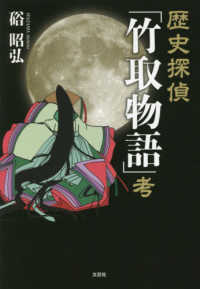- ホーム
- > 洋書
- > 英文書
- > Cinema / Film
Full Description
Simone de Beauvoir's notion of ambiguity became a cornerstone of her philosophy and influenced a radical rethinking of freedom well into the twenty-first century. In Ambiguous Cinema, Fuery examines Beauvoir's notion of ambiguity in relation to film experience, exploring both the legacies and limits of her existentialist ethics through a range of films by independent women filmmakers, including Joanna Hogg, Liliana Cavani, Debra Granik, Cheryl Dunye, Claire Denis, Lucrecia Martel, Lynne Ramsay and Céline Sciamma.
In doing so, Fuery deftly demonstrates the currency and relevancy of Beauvoir's ideas to contemporary debates in film-philosophy and feminist thought by examining how these women filmmakers navigate turbulent themes such as moral choice, power, adolescence, love, trauma and motherhood. Reimagining Beauvoir's idea of ambiguity within the context of film studies, Fuery asks that we confront and embrace difficult emotional situations so that we might realise an authentic, if indeterminate, freedom through our cinematic experiences.
Contents
Preface
Beauvoir's Ambiguity, Cinema and Feminist Phenomenology
Must We Burn Cavani? Moral Ambiguity in The Night Porter
Moments of Moral Choice in Debra Granik's Leave No Trace
Habit the Cinematic Encounter: Cheryl Dunye and the 'Dunyementaries'
A New (Ethical) Face on Love: Bad Faith and Claire Denis's Let the Sunshine In
A Cinema of the Borderlands: Lucrecia Martel's Zama
Sensuous Co-Performance: Lynne Ramsay's We Need to Talk About Kevin and Beauvoir's Aesthetic Attitude
Femme Desire and The Reciprocal Gaze in Céline Sciamma's Portrait of a Lady on Fire
Conclusion








